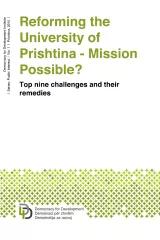Reforming the University of Prishtina - Mission Possible?
History used to divide people along royal blood, race or other traits. Modern times have rather seen growing poverty among the low-skilled. Predicting the advent of the machines, the Economist predicts that the future will divide people in two camps, those who invent or use technology well and those who will be replaced by it. Nations which fall behind in the race for knowledge will find themselves stuck as low-wage earners or worse.
Previous technological innovation have delivered more longrun employment, but this time it may be different. It is thence of highest strategic priority to take the future headon before we are rendered redundant by it. This paper is not a roadmap how to catch up with advanced countries, but it is a list of a shock therapy needed to get the patient to walk again.
To avoid the fate of low-skilled nations, tough decisions await education policy-makers and university administrators. Universities often teach yesterday’s skills by inertia and their teachers are still compensated generously from the taxpayers’ purse. We live in dynamic times where great syllabi may not be relevant by the time the first graduates that come out of the assembly line. As difficult as it seems, universities should strive to imbue graduates with the skills which will serve them for 40 years of their careers.
The global advent of technology means that reforms in higher education should be at the top of the priority pile for the country’s top leaders. There are great examples of several Asian countries which used education as the single most important policy to move them from third-world laggards to world-wide leaders in fourty years. Kosovo aims to join the European Union, the largest single market with
the highest competition for high-skilled jobs. The EU is in many ways the most exclusive club, but it may turn out the worst if Kosovo cannot compete with high-skills. The abundance of robotics and information technology will bring cheaper goods and faster and better services but it may also generate higher unemployment in its least educated quarters.
Despite the massive challenge, Kosovo has a chance with the University of Prishtina today. Just when much of the country is descending into chaos, the University of Prishtina has taken a turn for the better. Its difficulties are daunting, but at least it has a leadership that is not willing to compromise.
UP’s difficulties and the challenging path to getting out of the mess has started to resemble that of Kosovo. UP is an illustration that (a) hard work and steely principles pay off, (b) public boards composed of non-party professionals can make a change for better, and (c) it is possible to lead politicians of all colours to side with reforms. The UP has given hope to taxpayers that it can scotch the professors’
abusive privileges, inflationary promotions. Despite the challenges posed by an anti-quality coalition mounted by the academics, the new rector is trying to enforce high quality academic performance and merit based academic promotion. The UP may turn out to be a powerful moral institution and the very catalyst for renewed trust on ethical professionals.
Kosovo has a long path to traverse, but even the longest path has to start somewhere. Semi-skilled clerks already get paid twice higher in Kosovo than in some EU member states, an indication of skill scarcity. Such skill scarcity is a direct result of various educational policies, including protection of jobs of professors whose skills will hardly be needed in the future. Quality was seen as luxury by several successive
government, but the last minister has identified quality as a priority. Hence the timeliness of a report such as this one which identifies the nine most common diseases which plague the UP and the prescriptions how to treat them.
To make sure the future comes faster, students should be turned into clients on the one hand and citizens of their university as an institution. If they are informed about the teacher-student ratio, the number of students in the classroom, and quality education that makes a difference, they may make more judicious choices as per their future career and ethical orientation. Ultimately, their choice will
depend on their perception of the labour market. If they see a value in the shortest route to the diploma, there is little that can be done. But new jobs in Kosovo will be created only in the private sector, which cares for skills. A public institution like the UP has to provide with an ethical orientation which is long overdue and badly needed in Kosovo.
Leon Malazogu and Andreas Polterman
